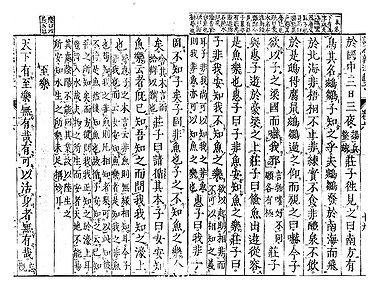(2017Translation) 知魚樂
| Primary Document | |
|---|---|

| |
| Title | |
| English | Knowing the joy of fish |
| Chinese | 知魚樂(Zhi yu le) |
| Korean(RR) | 지어락 |
| Document Details | |
| Genre | |
| Type | |
| Author(s) | Zhuangzi 莊子 |
| Year | |
| Key Concepts | |
| Translation Info | |
| Translator(s) | Participants of 2017 Summer Hanmun Workshop (Intermediate Training Group) |
| Editor(s) | |
| Year | 2017 |
목차
- 1 Original Script
- 2 Translation
- 2.1 Student 1 : Sanghoon Na
- 2.2 Student 2 : (Write your name)
- 2.3 Student 3 : (Write your name)
- 2.4 Student 4 : (Write your name)
- 2.5 Student 5 : (Write your name)
- 2.6 Student 6 : (Write your name)
- 2.7 Student 7 : (Write your name)
- 2.8 Student 8 : (Bryan Sauvadet)
- 2.9 Student 9 : (Write your name)
- 2.10 Student 10 : (Write your name)
- 2.11 Student 11 : (Write your name)
- 2.12 Student 12 : (Write your name)
- 2.13 Student 13 : (Write your name)
- 2.14 Student 14 : (Write your name)
Original Script
Translation
Student 1 : Sanghoon Na
Zhuangzi and Huizi were strolling on the stone bridge over the Hao [River]. Zhuangzi said, 'minnows[1] come out to swim relaxedly[2]. That is the joy of fish.' Huizi said, 'You are not a fish; how do you know the joy of fish?' Zhuangzi said, 'You are not me. How do you know that I do not know the joy of fish?' Huizi said, '[Since] I am not you, it's true that I do not know you. [But] you certainly are not a fish. [Therefore,] It is absolutely true[3] that you do not know the joy of fish. Zhuangzi said, 'Let us please go back to the original question. What you asked was "How do I know the joy of fish?". You already knew that I knew it, but you asked me.[4] [Likewise] I knew it over the Hao [River].[5]
Student 2 : (Write your name)
Student 3 : (Write your name)
Student 4 : (Write your name)
Student 5 : (Write your name)
Student 6 : (Write your name)
Student 7 : (Write your name)
Student 8 : (Bryan Sauvadet)
“Zhi yu le” 知魚樂 [Knowing the joy of fish], Zhuangzi
莊子與惠子遊於濠梁之上。
Zhuangzi and Huizi are roaning on the stone bridge over the Hao River.
莊子曰:「儵魚出遊從容,是魚樂也。」
Zhuangzi said: “a little fish come out and play at their ease that is the enjoyment of the fish.”
惠子曰:「子非魚,安知魚之樂?」
Huizi said: “You are not a fish, how do you now the fish’s enjoyment?”
莊子曰:「子非我,安知我不知魚之樂?」
Zhuangzi said: “You are not me, how do you know that I don’t know the enjoyment of the fish?”
惠子曰:「我非子,固不知子矣;子固非魚也,子之不知魚之樂全矣。」
Huizi said: “I don’t know you, but you, apparently, are not a fish, so you don’t know the complete enjoyment of the fish?”
莊子曰:「請循其本。子曰『汝安知魚樂』云者,既已知吾知之而問我,我知之濠上也。」
Zhuangzi said: “Go back where are started, you said ‘How do you know fish is happy?’ that mean that you really know that I know and ask me, and I know it over the Hao River.
Student 9 : (Write your name)
Student 10 : (Write your name)
Student 11 : (Write your name)
Student 12 : (Write your name)
Student 13 : (Write your name)
Student 14 : (Write your name)
- ↑ [1] 儵 : 역주2. 피라미가 나와서 한가로이 놂. 儵는 피라미. '조'로 읽는다. 徐邈은 음을 條로 읽어야 한다고 풀이했다. 盧文弨는 “儵는 鯈(조)로 써야 한다. 注의 글자도 마찬가지이다. 이 책 안에서는 혼용하는 경우가 많다[儵當作鯈 注同 此書內多混用].”고 풀이했다.
- ↑ [2] 從容 : 역주2. 從容에는 여러 가지 뜻이 있지만 여기서는 한가로이 노니는 모양. 成玄英은 “從容은 마음 놓고 노는 모양이다[從容 放逸之貌也].”고 풀이했다.
- ↑ [3] 全矣 : 역주5. 全矣는 틀림없다는 뜻. 方勇‧陸永品은 혜시가 자신의 주장이 완전하다는 뜻으로 말한 것이라고 풀이했다.
- ↑ [4] 既已知吾知之 : 역주8. 이미 내가 그것(물고기의 즐거움)을 알고 있음을 알고서 나에게 물어온 것일세. 내가 물고기의 즐거움을 이미 알 수 있다고 인정한 것이라는 뜻. 곧 자네가 내가 아닌데도 내가 물고기의 즐거움을 아는지 모르는지를 자네가 알 수 있다고 말한 것과 다를 바 없다는 뜻. 실제 혜시의 언급이 이런 뜻은 아닌데 장자가 슬쩍 왜곡한 것이다.
- ↑ [5] 我知之濠上也 : 역주9. 나는 그것을 濠水 가에서 알았지. 장자가 혜시가 어떻게 알 수 있느냐[安知魚樂]고 물은 것을 일부러 “어디에서 알았느냐?”고 물은 것처럼 슬쩍 왜곡해서 “어디서 알긴 어디에서 알아? 濠水 가에서 알았지.” 하고 농담한 것이다. 郭沫若은 莊子가 惠施의 본의를 일부러 곡해해서 安을 何處의 뜻으로 쓰고 일부러 그 장소(濠上)를 말했다고 했는데 탁견이다.